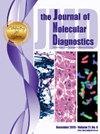Surveillance of Disease Progression in Metastatic Breast Cancer by Molecular Counting of Circulating Tumor DNA Using Plasma-SeqSensei Breast Cancer in Vitro Diagnostics Assay
IF 3.4
3区 医学
Q1 PATHOLOGY
引用次数: 0
Abstract
Circulating tumor DNA (ctDNA) quantification surpasses cancer antigen 15 to 3 for metastatic breast cancer surveillance. Clinical translation, however, is limited because of uncertainties about the optimal method and clinically valid ctDNA decision thresholds. Plasma-SeqSensei Breast Cancer IVD kit (PSS) is a novel assay for ctDNA molecular counting, detecting ≥0.06% variant allele fractions in AKT1, ERBB2, ESR1, KRAS, PIK3CA, and TP53. PSS was validated against droplet digital PCR (ddPCR) in 201 samples from 16 subjects with PIK3CA/TP53-mutated cancers, longitudinally sampled for a median of 93 (range, 18 to 113) weeks, three to five weekly. PSS and ddPCR ctDNA levels correlate significantly (Spearman ρ, 0.923; 95% CI, 0.898–0.941) across 0% to 43% variant allele frequency (VAF) range. PSS predicts 12-week progression with high clinical accuracy (area under the curve, 0.848; 95% CI, 0.790–0.894). PSS validates a previously developed ddPCR classifier: <10 copies/mL (0.25% VAF); excludes >100 copies/mL (2.5% VAF); and confirms progression, with negative predictive value (95% CI) of 83% (76%–88%) and positive predictive value (95% CI) of 91% (81%–96%) (weighted κ, 0.856; 95% CI, 0.797–0.915). PSS thus confirms robust clinical thresholds (10 to 100 copies/mL, 0.25% to 2.5% VAF) for metastatic breast cancer surveillance, using absolute molecular counting.
使用 Plasma-SeqSensei 乳腺癌体外诊断试剂盒对循环肿瘤 DNA 进行分子计数,监测转移性乳腺癌的病情进展。
在转移性乳腺癌监测方面,循环肿瘤 DNA(ctDNA)定量超过了癌症抗原 15 至 3。然而,由于最佳方法和临床有效的ctDNA判定阈值尚不确定,临床转化受到了限制。Plasma-SeqSensei 乳腺癌 IVD 检测试剂盒(PSS)是一种新型的 ctDNA 分子计数检测方法,可检测 AKT1、ERBB2、ESR1、KRAS、PIK3CA 和 TP53 中≥0.06% 的变异等位基因。在 16 名 PIK3CA/TP53 突变癌症受试者的 201 份样本中,PSS 与液滴数字 PCR(ddPCR)进行了验证,这些样本的纵向采样时间中位数为 93 周(范围为 18 至 113 周),每周采样 3 至 5 次。在 0% 到 43% 的变异等位基因频率 (VAF) 范围内,PSS 和 ddPCR ctDNA 水平有显著相关性(Spearman ρ,0.923;95% CI,0.898-0.941)。PSS 预测 12 周的病情进展具有很高的临床准确性(曲线下面积为 0.848;95% CI 为 0.790-0.894)。PSS 验证了之前开发的 ddPCR 分类器:100拷贝/毫升(2.5% VAF);并确认病情进展,阴性预测值(95% CI)为 83%(76%-88%),阳性预测值(95% CI)为 91%(81%-96%)(加权κ,0.856;95% CI,0.797-0.915)。因此,PSS 证实了使用绝对分子计数监测转移性乳腺癌的可靠临床阈值(10 至 100 拷贝/毫升,0.25% 至 2.5% VAF)。
本文章由计算机程序翻译,如有差异,请以英文原文为准。
求助全文
约1分钟内获得全文
求助全文
来源期刊
CiteScore
8.10
自引率
2.40%
发文量
143
审稿时长
43 days
期刊介绍:
The Journal of Molecular Diagnostics, the official publication of the Association for Molecular Pathology (AMP), co-owned by the American Society for Investigative Pathology (ASIP), seeks to publish high quality original papers on scientific advances in the translation and validation of molecular discoveries in medicine into the clinical diagnostic setting, and the description and application of technological advances in the field of molecular diagnostic medicine. The editors welcome for review articles that contain: novel discoveries or clinicopathologic correlations including studies in oncology, infectious diseases, inherited diseases, predisposition to disease, clinical informatics, or the description of polymorphisms linked to disease states or normal variations; the application of diagnostic methodologies in clinical trials; or the development of new or improved molecular methods which may be applied to diagnosis or monitoring of disease or disease predisposition.

 求助内容:
求助内容: 应助结果提醒方式:
应助结果提醒方式:


